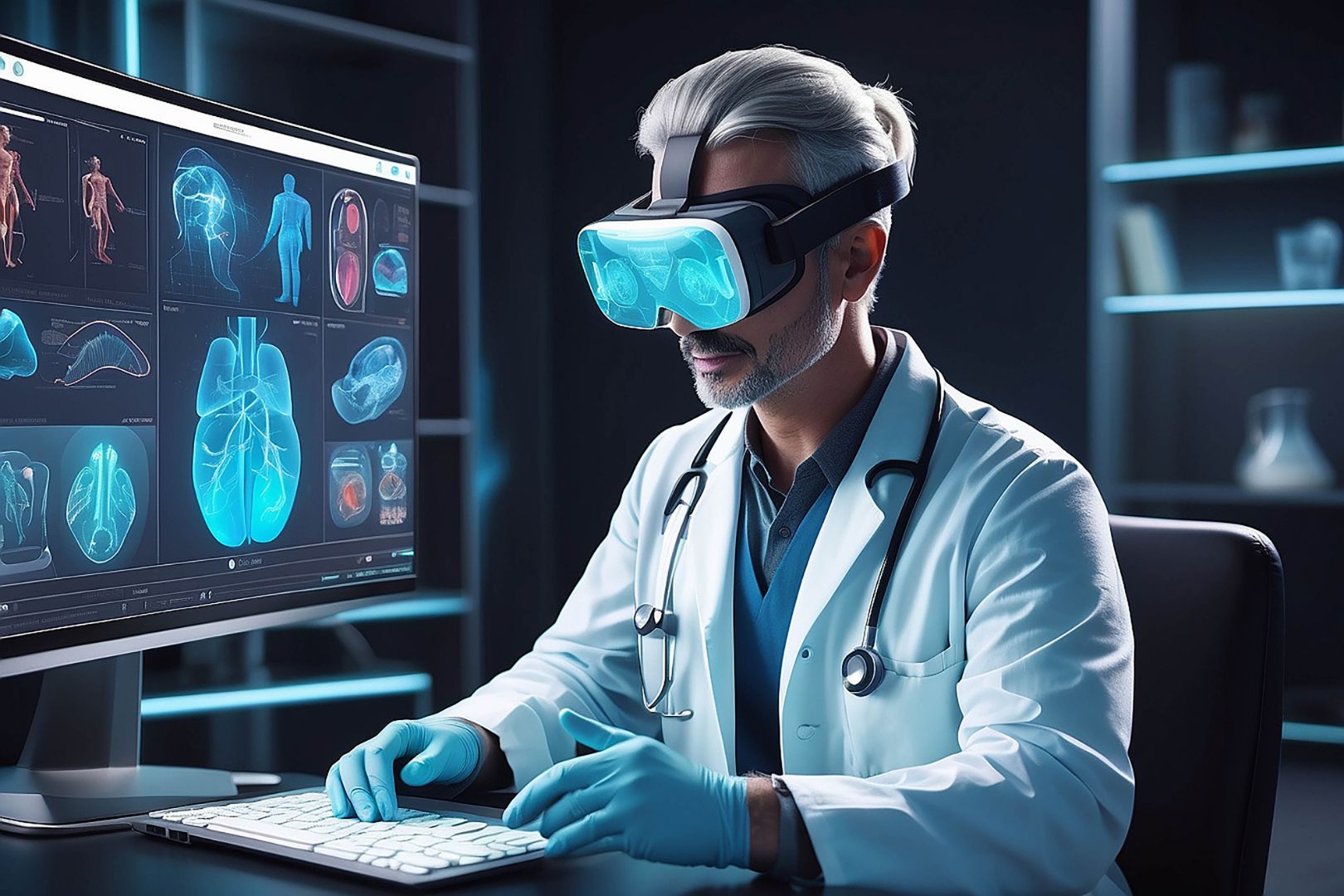
Impact of AI and Modern Technologies in Healthcare
In recent years, the healthcare sector has undergone significant transformation driven by cutting-edge artificial intelligence (AI) and modern technologies. These innovations are reshaping patient diagnosis, treatment, and administrative tasks, revolutionizing every aspect of healthcare. This transformation not only improves patient care but also generates numerous job opportunities across diverse healthcare domains.
- Enhanced Diagnostics and Precision Medicine: AI revolutionizes healthcare diagnostics by analyzing extensive medical data, including patient records, scans, and genomics. Using machine learning, AI identifies patterns, aids early disease detection, and tailors personalized treatment plans for patients based on individual characteristics.
- Remote Patient Monitoring and Telemedicine: Telemedicine and remote patient monitoring have expanded healthcare access, especially in underserved regions. AI-driven apps monitor vital signs and treatment progress from patients' homes, enabling healthcare providers to intervene remotely and reduce hospital visits, improving patient satisfaction and outcomes.
- Streamlined Administrative Processes: AI enhances administrative workflows in healthcare by automating tasks like transcription and coding through NLP algorithms. Predictive analytics models optimize resource allocation and appointment scheduling, ensuring efficient operations and cost-effective delivery.
- Robotics and Surgical Innovation: Robotic-assisted surgery transforms surgical techniques, providing precision and minimally invasive approaches. Surgeons guide robotic systems with advanced imaging and navigation, improving surgical outcomes. AI algorithms analyze real-time data, offering insights to optimize techniques and reduce complications, revolutionizing surgical innovation.
Job Opportunities in the AI-Driven Healthcare Landscape
The integration of AI and modern technologies into healthcare has generated numerous job opportunities across various fields.
- AI Specialists and Data Scientists: Data scientists and AI specialists play a pivotal role in developing and implementing machine learning algorithms, predictive analytics models, and data-driven solutions in healthcare settings. They analyze large datasets, extract meaningful insights, and develop predictive models to improve clinical decision-making and patient outcomes.
- Health Informatics Specialists: Health Informatics Specialists generally known as Healthcare informaticians bridge the gap between technology and clinical practice, leveraging their expertise to design and optimize electronic health record systems, health information exchanges, and clinical decision support tools. They ensure interoperability, data integrity, and compliance with regulatory standards, facilitating seamless communication and information exchange across healthcare networks.
- Telemedicine and Remote Monitoring Specialists: Telemedicine specialists and remote monitoring technicians enable the seamless delivery of virtual care services, leveraging telecommunication technologies and remote monitoring devices to connect patients with healthcare providers. They educate patients on telehealth platforms, troubleshoot technical issues, and facilitate remote consultations, ensuring continuity of care and patient engagement.
- Healthcare Administrators and Operations Managers: Healthcare administrators and operations managers oversee the strategic planning, implementation, and optimization of AI-driven healthcare solutions within healthcare organizations. They collaborate with interdisciplinary teams, manage financial resources, and navigate regulatory frameworks to drive operational excellence and improve patient outcomes.
- Clinical Research and Innovation Professionals: Clinical research and innovation professionals explore novel applications of AI and technology in healthcare through translational research, clinical trials, and collaborative partnerships. They design research protocols, collect and analyze clinical data, and evaluate the efficacy and safety of emerging technologies, contributing to evidence-based practice and continuous quality improvement.
- and many more…
Explore few certifications and courses in AI-driven healthcare
To enhance the skills and qualifications in line with the evolving landscape of AI-driven healthcare, consider pursuing a few certifications and educational courses which support career growth.
- Certified Healthcare Information Systems Security Practitioner (CHISSP): Focuses on securing healthcare information systems and ensuring compliance with regulatory standards like HIPAA, enhancing data integrity and patient privacy.
- Certified Artificial Intelligence Professional (CAIP): Focuses on the application of AI in various industries, including healthcare. It covers topics such as machine learning, natural language processing, and AI ethics.
- Certified Professional in Healthcare Information and Management Systems (CPHIMS): Validates expertise in healthcare information and management systems, covering areas like electronic health records, health information exchanges, and clinical decision support systems.
- Certified Health Data Analyst (CHDA): Equips professionals with skills in health data analysis, interpretation, and reporting, essential for leveraging data-driven insights to improve patient care and outcomes.
- Certifications in Telehealth/Telemedicine and Remote Patient Monitoring: Equip you with the knowledge needed to excel in the rapidly expanding field of telemedicine technologies, remote patient monitoring devices, and best practices for delivering virtual care services, preparing professionals to meet the growing demand for telehealth solutions.
- Advanced Certification in Healthcare Artificial Intelligence (HCAI): Focuses on advanced concepts and applications of artificial intelligence in healthcare, including machine learning algorithms, predictive analytics, and natural language processing, empowering professionals to drive innovation and efficiency in healthcare delivery.
- Health Informatics Certificate Programs: Often cover electronic health record systems, health information exchanges, and clinical decision support tools.
- Clinical Research Professional Certification: Certifications such as the Society of Clinical Research Associates (SoCRA) or the Association of Clinical Research Professionals (ACRP) validate your expertise in clinical research methodologies.
Make it a habit to listen/attend related podcasts and workshops
- Healthcare Operations Management Courses: Workshops/Courses in healthcare operations management will provide you with insights into strategic planning, financial management, and regulatory frameworks.
- Machine Learning and Data Science Courses: Stay ahead in the data-driven landscape by enrolling in courses that focus on machine learning and data science.
- Professional Development in Robotics and Surgical Innovation: Workshops and courses that specialize in the integration of robotics in healthcare and surgical innovation can provide hands-on experience and practical insights.
- Continuous Learning in AI and Healthcare Integration: Stay updated with the latest advancements in AI and healthcare integration through continuous learning. Subscribe to reputable journals, attend webinars, and participate in conferences to stay abreast of emerging trends.
- Platforms like Coursera, edX, etc. offer specialized courses from top universities and institutions.
These certifications, educational courses and workshops not only enhance the professional capabilities but also position the healthcare professionals for exciting career opportunities in the rapidly evolving landscape of AI-driven healthcare.
In conclusion, as we navigate the evolving landscape of healthcare delivery, the demand for skilled professionals equipped with expertise in technology and healthcare continues to rise, offering abundant opportunities for career growth, professional development, and societal impact in the digital era of healthcare.





